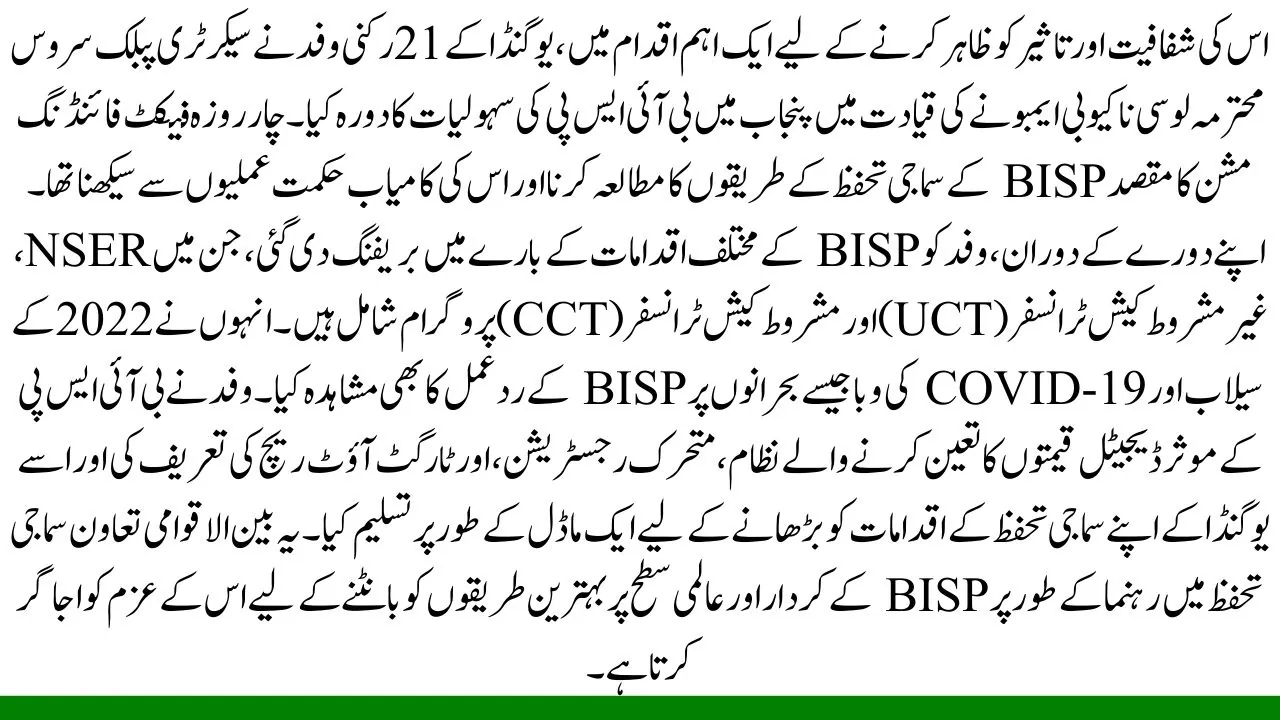Contents
BISP Funds Distribution
The Benazir Income Support Programme (BISP) is one of Pakistan’s most significant social safety initiatives, designed to provide financial assistance to the country’s most vulnerable and deserving households. Established to alleviate poverty and empower marginalized communities, BISP plays a crucial role in ensuring that financial aid reaches those who need it the most. The programme offers unconditional and conditional cash transfers to support low-income families, particularly focusing on women as primary beneficiaries. Through its comprehensive distribution system, BISP aims to improve the living standards of millions of Pakistani families, promoting economic stability and social welfare across the nation.
Purpose and Objectives of BISP
The primary purpose of BISP Funds Distribution is to reduce poverty and enhance the quality of life for impoverished families in Pakistan. By providing regular cash stipends, the programme empowers women, enabling them to make informed decisions regarding their household needs. The objectives of BISP include improving health and education outcomes, fostering economic independence, and promoting gender equality. Additionally, BISP aims to create a safety net that protects families from economic shocks and unforeseen hardships. By targeting the most vulnerable segments of society, BISP strives to create a more equitable and inclusive society where every individual has the opportunity to thrive and contribute to national development.
Transparency and Verification Mechanism
Ensuring transparency and accuracy in funds distribution is a cornerstone of BISP’s operations. The programme employs the National Socio-Economic Registry (NSER), a comprehensive database that accurately identifies and registers eligible beneficiaries. This system minimizes the risk of fraud and ensures that aid reaches the intended recipients. Additionally, BISP utilizes dynamic registration and biometric verification to maintain up-to-date records and prevent duplication. Regular audits and evaluations are conducted to monitor the effectiveness of the distribution process, ensuring that the funds are utilized appropriately. These robust verification mechanisms uphold the programme’s integrity, fostering trust among beneficiaries and the general public.
Uganda Delegation’s Visit and Feedback
In a significant move to showcase its transparency and effectiveness, a 21-member Ugandan delegation led by Secretary of Public Service Ms. Lucy Nakyobe Mbonye visited BISP facilities in Punjab. The four-day fact-finding mission aimed to study BISP’s social safety practices and learn from its successful strategies. During their visit, the delegation was briefed on various BISP initiatives, including the NSER, Unconditional Cash Transfer (UCT), and Conditional Cash Transfer (CCT) programs. They also observed BISP’s response to crises such as the 2022 floods and the COVID-19 pandemic. The delegation praised BISP’s efficient digital pricing system, dynamic registration, and targeted outreach, recognizing it as a model for Uganda to enhance its own social safety initiatives. This international collaboration underscores BISP’s role as a leader in social protection and its commitment to sharing best practices globally.
Latest Update on BISP Stipend
Recent updates from Rubina Khalid have shed light on changes to the BISP stipend distribution. While BISP has been offering a stipend of Rs 13,500, it has been reported that women are currently receiving only Rs 10,500 when they go to collect their money. According to Rubina Khalid, the full amount of Rs 13,500 has not yet been officially sanctioned and is expected to be available starting January 2025. Until then, beneficiaries will continue to receive Rs 10,500 through designated bank locations. Starting in January 2025, BISP plans to distribute the stipend via Automated Teller Machines (ATMs), making the process more convenient and secure for recipients. Women who have not yet registered are urged to do so promptly, while those who are ineligible may have the opportunity to re-register.

ATM withdrawals
Looking ahead, BISP is committed to enhancing its funds distribution system to better serve Pakistan’s needy populations. The anticipated increase in the stipend to Rs 13,500, along with the introduction of ATM withdrawals, is expected to significantly improve beneficiaries’ access to financial support. These changes aim to streamline the distribution process, reduce wait times, and ensure that funds are delivered more efficiently and securely. Additionally, BISP plans to continue expanding its outreach through dynamic registration and targeted verification processes, ensuring that aid reaches the right people. The programme’s future initiatives include increasing the stipend amount, expanding the network of distribution points, and incorporating advanced technologies to further enhance transparency and accountability. These efforts are expected to have a profound impact on reducing poverty, empowering women, and fostering economic growth across Pakistan.
Also Read: BISP Beneficiaries Expected to Reach 10 Million by December: Latest Update
Conclusion
The Benazir Income Support Programme (BISP) remains a pivotal initiative in Pakistan’s fight against poverty and social inequality. Through its transparent and efficient funds distribution system, BISP ensures that financial aid reaches the most vulnerable and deserving households. The recent updates on stipend distribution, coupled with international recognition from the Ugandan delegation, highlight BISP’s commitment to excellence and continuous improvement. As BISP prepares to implement significant changes in its distribution process, including the increase in stipend amounts and the introduction of ATM withdrawals, it stands poised to enhance its impact on millions of lives. By empowering women and supporting low-income families, BISP contributes to building a more inclusive and prosperous society, paving the way for sustainable development and economic stability in Pakistan.

